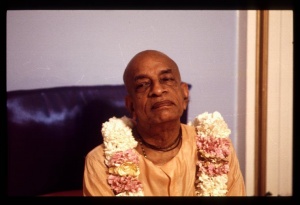SB 3.22.23

A.C. Bhaktivedanta Swami Prabhupada
TEXT 23
- śatarūpā mahā-rājñī
- pāribarhān mahā-dhanān
- dampatyoḥ paryadāt prītyā
- bhūṣā-vāsaḥ paricchadān
SYNONYMS
śatarūpā — Empress Śatarūpā; mahā-rājñī — the Empress; pāribarhān — dowry; mahā-dhanān — valuable presents; dam-patyoḥ — to the bride and bridegroom; paryadāt — gave; prītyā — out of affection; bhūṣā — ornaments; vāsaḥ — clothes; paricchadān — articles for household use.
TRANSLATION
Empress Śatarūpā lovingly gave most valuable presents, suitable for the occasion, such as jewelry, clothes and household articles, in dowry to the bride and bridegroom.
PURPORT
The custom of giving one's daughter in charity with a dowry is still current in India. The gifts are given according to the position of the father of the bride. Pāribarhān mahā-dhanān means the dowry which must be awarded to the bridegroom at the time of marriage. Here mahā-dhanān means greatly valuable gifts befitting the dowry of an empress. The words bhūṣā-vāsaḥ paricchadān also appear here. Bhūṣā means "ornaments," vāsaḥ means "clothing," and paricchadān means "various household articles." All things befitting the marriage ceremony of an emperor's daughter were awarded to Kardama Muni, who was until now observing celibacy as a brahmacārī. The bride, Devahūti, was very richly dressed with ornaments and clothing.
In this way Kardama Muni was married with full opulence to a qualified wife and was endowed with the necessary paraphernalia for household life. In the Vedic way of marriage such a dowry is still given to the bridegroom by the father of the bride; even in poverty-stricken India there are marriages where hundreds and thousands of rupees are spent for a dowry. The dowry system is not illegal, as some have tried to prove. The dowry is a gift given to the daughter by the father to show good will, and it is compulsory. In rare cases where the father is completely unable to give a dowry, it is enjoined that he must at least give a fruit and a flower. As stated in Bhagavad-gītā, God can also be pleased even by a fruit and a flower. When there is financial inability and no question of accumulating a dowry by another means, one can give a fruit and flower for the satisfaction of the bridegroom.